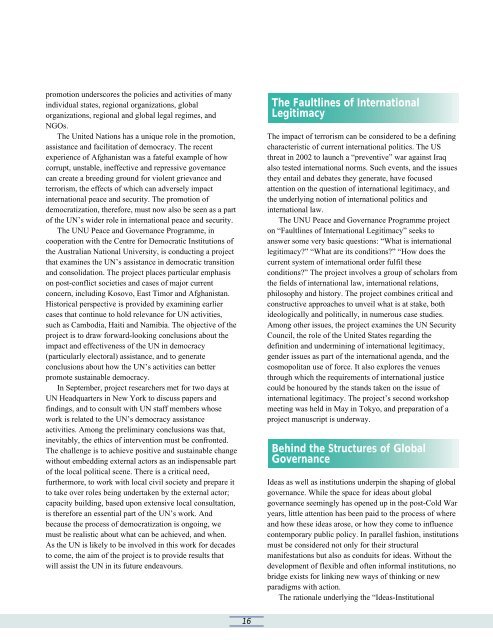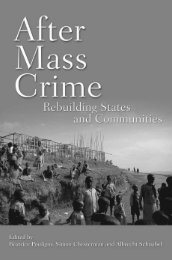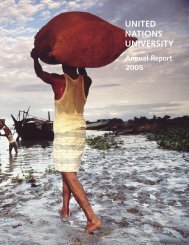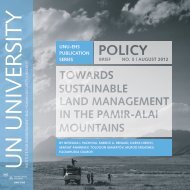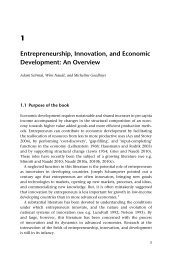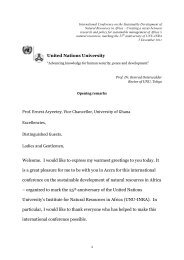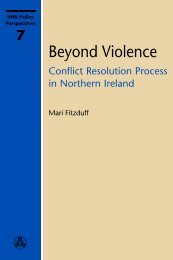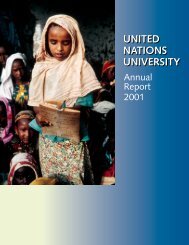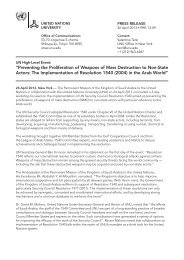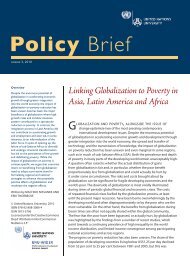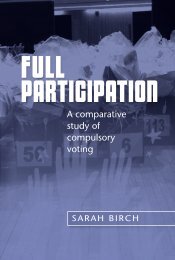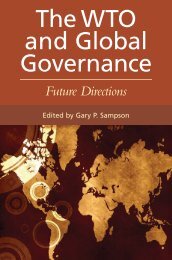Environment and Sustainable Development - United Nations ...
Environment and Sustainable Development - United Nations ...
Environment and Sustainable Development - United Nations ...
Create successful ePaper yourself
Turn your PDF publications into a flip-book with our unique Google optimized e-Paper software.
promotion underscores the policies <strong>and</strong> activities of many<br />
individual states, regional organizations, global<br />
organizations, regional <strong>and</strong> global legal regimes, <strong>and</strong><br />
NGOs.<br />
The <strong>United</strong> <strong>Nations</strong> has a unique role in the promotion,<br />
assistance <strong>and</strong> facilitation of democracy. The recent<br />
experience of Afghanistan was a fateful example of how<br />
corrupt, unstable, ineffective <strong>and</strong> repressive governance<br />
can create a breeding ground for violent grievance <strong>and</strong><br />
terrorism, the effects of which can adversely impact<br />
international peace <strong>and</strong> security. The promotion of<br />
democratization, therefore, must now also be seen as a part<br />
of the UN’s wider role in international peace <strong>and</strong> security.<br />
The UNU Peace <strong>and</strong> Governance Programme, in<br />
cooperation with the Centre for Democratic Institutions of<br />
the Australian National University, is conducting a project<br />
that examines the UN’s assistance in democratic transition<br />
<strong>and</strong> consolidation. The project places particular emphasis<br />
on post-conflict societies <strong>and</strong> cases of major current<br />
concern, including Kosovo, East Timor <strong>and</strong> Afghanistan.<br />
Historical perspective is provided by examining earlier<br />
cases that continue to hold relevance for UN activities,<br />
such as Cambodia, Haiti <strong>and</strong> Namibia. The objective of the<br />
project is to draw forward-looking conclusions about the<br />
impact <strong>and</strong> effectiveness of the UN in democracy<br />
(particularly electoral) assistance, <strong>and</strong> to generate<br />
conclusions about how the UN’s activities can better<br />
promote sustainable democracy.<br />
In September, project researchers met for two days at<br />
UN Headquarters in New York to discuss papers <strong>and</strong><br />
findings, <strong>and</strong> to consult with UN staff members whose<br />
work is related to the UN’s democracy assistance<br />
activities. Among the preliminary conclusions was that,<br />
inevitably, the ethics of intervention must be confronted.<br />
The challenge is to achieve positive <strong>and</strong> sustainable change<br />
without embedding external actors as an indispensable part<br />
of the local political scene. There is a critical need,<br />
furthermore, to work with local civil society <strong>and</strong> prepare it<br />
to take over roles being undertaken by the external actor;<br />
capacity building, based upon extensive local consultation,<br />
is therefore an essential part of the UN’s work. And<br />
because the process of democratization is ongoing, we<br />
must be realistic about what can be achieved, <strong>and</strong> when.<br />
As the UN is likely to be involved in this work for decades<br />
to come, the aim of the project is to provide results that<br />
will assist the UN in its future endeavours.<br />
The Faultlines of International<br />
Legitimacy<br />
The impact of terrorism can be considered to be a defining<br />
characteristic of current international politics. The US<br />
threat in 2002 to launch a “preventive” war against Iraq<br />
also tested international norms. Such events, <strong>and</strong> the issues<br />
they entail <strong>and</strong> debates they generate, have focused<br />
attention on the question of international legitimacy, <strong>and</strong><br />
the underlying notion of international politics <strong>and</strong><br />
international law.<br />
The UNU Peace <strong>and</strong> Governance Programme project<br />
on “Faultlines of International Legitimacy” seeks to<br />
answer some very basic questions: “What is international<br />
legitimacy” “What are its conditions” “How does the<br />
current system of international order fulfil these<br />
conditions” The project involves a group of scholars from<br />
the fields of international law, international relations,<br />
philosophy <strong>and</strong> history. The project combines critical <strong>and</strong><br />
constructive approaches to unveil what is at stake, both<br />
ideologically <strong>and</strong> politically, in numerous case studies.<br />
Among other issues, the project examines the UN Security<br />
Council, the role of the <strong>United</strong> States regarding the<br />
definition <strong>and</strong> undermining of international legitimacy,<br />
gender issues as part of the international agenda, <strong>and</strong> the<br />
cosmopolitan use of force. It also explores the venues<br />
through which the requirements of international justice<br />
could be honoured by the st<strong>and</strong>s taken on the issue of<br />
international legitimacy. The project’s second workshop<br />
meeting was held in May in Tokyo, <strong>and</strong> preparation of a<br />
project manuscript is underway.<br />
Behind the Structures of Global<br />
Governance<br />
Ideas as well as institutions underpin the shaping of global<br />
governance. While the space for ideas about global<br />
governance seemingly has opened up in the post-Cold War<br />
years, little attention has been paid to the process of where<br />
<strong>and</strong> how these ideas arose, or how they come to influence<br />
contemporary public policy. In parallel fashion, institutions<br />
must be considered not only for their structural<br />
manifestations but also as conduits for ideas. Without the<br />
development of flexible <strong>and</strong> often informal institutions, no<br />
bridge exists for linking new ways of thinking or new<br />
paradigms with action.<br />
The rationale underlying the “Ideas-Institutional<br />
16


